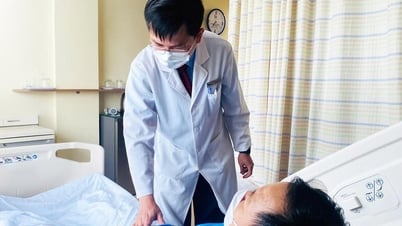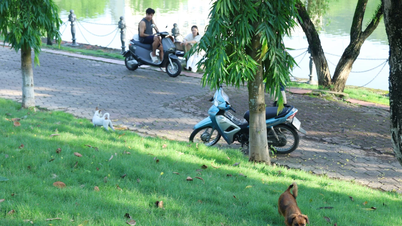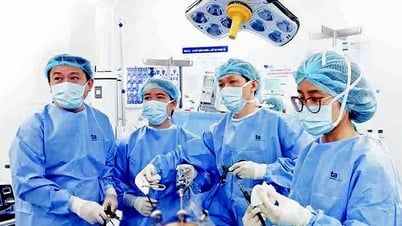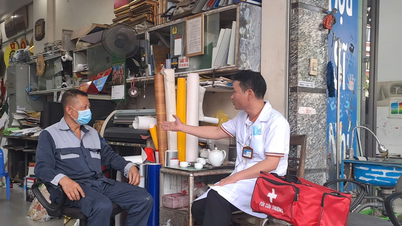Medical news June 19: Signs of the third most common cancer in the world
The World Cancer Registry (GLOBOCAN) 2020 statistics show that kidney cancer is the third most common urinary system cancer worldwide.
Signs of kidney cancer
Ms. D.QV (49 years old, Vinh Long ) came to the hospital for a general health check-up. When taking a 768-slice computed tomography (CT) scan of her abdomen, the doctor discovered a very large tumor in her right kidney.
 |
| The World Cancer Registry (GLOBOCAN) 2020 statistics show that kidney cancer is the third most common urinary system cancer worldwide. |
The strange thing is that the 10x11cm tumor caused the right kidney to expand from the shape of a bean to the shape of a papaya. The tumor made the right kidney twice as big as the left kidney with a normal shape. This surprised her, because before that, she had no unusual symptoms.
Doctors explained that although the tumor was large, it was located in the retroperitoneal cavity and did not compress surrounding organs, so the patient did not feel pain.
The conclusion clearly showed that Ms. V. had kidney cancer at stage T2bN0M0, meaning it was still localized, had not invaded the renal capsule or lymph nodes, and had not metastasized, and could be surgically removed to treat the entire tumor. However, because the tumor was too large, laparoscopic surgery was not possible and open surgery was required.
The doctor took the collected specimens and sent them for testing. The pathology results showed that Ms. V.'s right kidney tumor was clear cell carcinoma, the most common type of kidney cancer, accounting for 80%-85% of cases.
Dr. Le Phuc Lien, Head of the Female Urology Unit, Center for Urology - Nephrology - Andrology, Tam Anh General Hospital, Ho Chi Minh City, said that the patient only has one kidney, so she needs to pay attention to controlling her diet and water intake to avoid overloading the remaining kidney, leading to impaired kidney function. Ms. V. also needs to limit strenuous exercise, avoid hip injuries, which can easily damage the remaining kidney.
In addition, according to the pathology results, no cancer cells were detected in the sections, meaning that the cancer was completely removed from the body after surgery, and no further chemotherapy was needed. However, she needs to have regular check-ups in the first 2 years so that the doctor can monitor and assess the risk of cancer recurrence.
According to the 2020 statistics of the World Cancer Registry (GLOBOCAN), kidney cancer is the third most common urinary system cancer worldwide, after prostate cancer and bladder cancer, with nearly 435,000 new cases and nearly 156,000 deaths.
At the same time in Vietnam, GLOBOCAN recorded kidney cancer as the second most common urinary cancer, after prostate cancer, with 2,246 new cases and 1,112 deaths.
The cause of kidney cancer is not yet clearly determined. Some groups of people at risk of the disease include the elderly; obese, long-term smokers; those with high blood pressure, chronic kidney failure requiring dialysis, polycystic kidney disease, and people who are regularly exposed to toxic chemicals...
In the early stages, the tumor is still small (less than 3cm), kidney cancer has no symptoms, only discovered by chance during a health check. When symptoms such as flank pain, blood in urine, feeling a tumor protruding from the hip, loss of appetite, unusual weight loss, fatigue, etc. appear, kidney cancer is already in the late stages. If additional symptoms of bone pain and persistent cough appear, the cancer has entered the metastatic stage.
For non-metastatic kidney cancer, depending on the size of the tumor, partial or total nephrectomy is the optimal choice and can completely cure the disease.
In cases of metastatic cancer, in addition to tumor removal surgery, the patient needs additional treatment with chemotherapy, radiotherapy, targeted therapy, etc.
However, treatment in the late stage only slows down the rate of metastasis, relieves symptoms, and improves the patient's quality of life, but cannot cure the disease.
Dr. Le Phuc Lien recommends that people should develop the habit of having regular health check-ups every 6-12 months to detect early abnormal tumors in the kidney so that they can have early treatment options, only needing to remove the tumor, not the entire kidney. Avoid cases where detection is too late, treatment is difficult, and seriously affects health.
In addition, Dr. Phuc Lien advises people who have symptoms of long-term back pain that does not go away, blood in the urine, loss of appetite, unusual weight loss, etc. to go to the hospital immediately. People with relatives with a history of cancer in both kidneys should be screened for kidney cancer early because it is possible that it is hereditary.
Warning of dangerous rabies
Information from the Central Hospital for Tropical Diseases, the hospital has just received a 72-year-old female patient from Hoa Binh who was transferred to the Emergency Department, in a state of needing a ventilator. The patient was diagnosed with rabies, tetanus, and septic shock.
The patient’s family said that on April 1, the patient was bitten on the leg by a dog (a 3-month-old puppy that had not been vaccinated against rabies). Immediately after the bite, the dog was beaten to death.
When the wounds were bleeding, the patient disinfected himself with alcohol at home. Because of his subjectivity, the patient also did not get a stomach vaccination.
In the past 4 days, the patient had headaches, nausea, vomiting, fear of water and wind, and stiff limbs twice for about 10 minutes. The patient was transferred to a medical facility for treatment in a state of respiratory muscle contraction.
The patient was intubated, ventilated, given antibiotics, vasopressors, sedatives, etc. The patient was diagnosed, monitored for rabies and tetanus; pneumonia, monitored for liver abscess/hypertension and transferred to the Emergency Department.
When doing PCR test of saliva, cerebrospinal fluid had positive result for rabies virus. The doctor explained to the patient about the severe prognosis, risk of death, the family signed the documents to request home care.
According to doctors, rabies is an acute infectious disease caused by the rabies virus. The disease is transmitted mainly through bites, scratches, or licks from rabid animals on damaged skin.
The disease usually increases in the hot season from May to August every year. Clinical manifestations of rabies in humans are fear of water, fear of wind, convulsions, paralysis and death. Once rabies occurs, the mortality rate is almost 100% (for both humans and animals).
Rabies in humans can be prevented and treated prophylactically with vaccines and anti-rabies serum. Vaccination against rabies in both humans and animals (mainly dogs) is an effective measure to prevent and control rabies.
Source: https://www.vietnam.vn/dau-hieu-can-benh-ung-thu-pho-bien-thu-3-the-gioi/






























































































Comment (0)